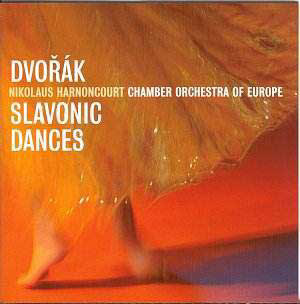I am in a bit of a quandary about this issue. It is
perhaps the best played of any version in the catalogue with the Chamber
of Orchestra of Europe displaying a virtuosity which is absolutely staggering.
This applies to both the fast and slow dances, and the phrasing is accurate,
both in terms of pitch and speed.
So far so good. Where I have reservations is in the
level of charm. Played by a Czech band (such as the Czech Philharmonic
under Karel Sejna, recorded by Supraphon in 1960) the playing sounds
so right, with lilting strings and woodwind and with discreet percussion,
the atmosphere is tangible. With Harnoncourt, the whole atmosphere is
one of fast and furious wherever possible.
It is not just a case of speed – it is more the phrasing
which is so different. I am an avid fan of Harnoncourt's interpretations
of the late Symphonies of Dvořák with
the Royal Concertgebouw, also on Teldec Classics. Here, the corporate
feel of the orchestra was never overridden, with the innate qualities
of the playing of the orchestra never submerged by the conductor. In
the case of the Slavonic Dances, the orchestra seems to be intent
on delivering exactly what the conductor wants, the intervening year
between the two sets of dances being indistinguishable from these recordings.
If you therefore like fast and furious performances
of these pieces – even George Szell did not perform these dances with
such gusto - I cannot think how you could possibly be disappointed with
this release. There is not much point in comparing playing times because
of the vagaries of repeats, etc. Also there is often a major difference
in tempo between the middle section and the outer sections of the dances.
The differences can make quite a difference to the total playing time
of each dance.
It is the most exciting modern recording of these popular
works that I have heard over the past few years. It is also interesting
to compare it with the recent Philips recording of Dvořák’s
masterpieces from Ivan Fischer and the Budapest Festival Orchestra.
They perform the works with a more Eastern European flavour than the
present issue, and whilst in no way superseding this, it gives the listener
another approach to this life-enhancing music. I wouldn’t like
to choose between the two issues, although personally I would go back
to Karel Sejna and the Czech Philharmonic every time.
Another feature of the current issue is that of the
size of the orchestra. Textures are somewhat lighter with the smaller
number of players involved, and the articulation is much clearer. Add
to this the virtuosity of the players. Make no mistake, the current
Chamber Orchestra is superb in this respect. With the smaller numbers,
there is also a distinct difference in the balance between brass and
woodwind against the strings. This is compensated for by the engineers
somewhat, but the different relationship between these sections of the
orchestra makes a difference which can be clearly heard.
Performance and recording is again absolutely superb,
and I can recommend this release with all due enthusiasm. However if
you really love the Slavonic Dances, I would urge you to seek out the
earlier Supraphon issue to hear the genuine article. For those of you
who just want the latest and best sounding recording, played with the
utmost panache, go for this issue. Don’t however give the Philips issue
a miss. Try to hear both and then make up your mind. Whatever the result,
you will enjoy yourselves, because the ultimate winner is Dvořák,
and each version has something special to say about these wonderful
dances.
John Phillips


![]() See
what else is on offer
See
what else is on offer 